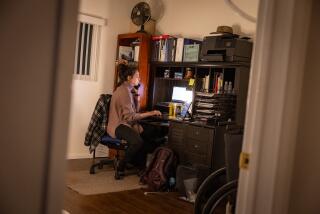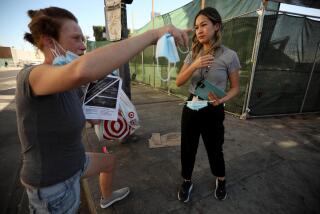Counselor Helps Hemophiliacs Face AIDS Fears
- Share via
It always has been difficult for parents and their hemophiliac children to cope with the life-threatening blood ailment, but today they face even more anxiety--the threat of AIDS.
A health educator is trying to help hemophiliacs and their parents in Orange County deal with the psychological and social stigma attached to AIDS, a fatal disease that attacks the body’s immune system.
The task is so great that the educator likens it “to being dropped by helicopter in Antarctica with an ice pick.”
Russ Mihal, 38, a health educator and social worker for the Hemophilia Council of California and AIDS Project, comes to Orange County twice a week to counsel six families. He is also trying to form a support and education network for the many others he has yet to reach.
Schoolmates and neighbors unjustly persecute children with AIDS and their families, primarily because they believe they can contract the disease through casual contact, Mihal said.
‘Poisoning Yourself’
Hemophilia is a blood condition in which the blood-clotting agent is absent, resulting in profuse bleeding, even from minor cuts. Many hemophiliacs have contracted the AIDS virus through transfusions of contaminated blood.
“It’s one thing having to deal with hemophilia your whole life and another to have used contaminated blood in a transfusion,” Mihal said. “You’re literally poisoning yourself with no choice.”
Of all the people Mihal has counseled on AIDS--including AIDS patients, potential victims and their families--parents of hemophiliac children are the most difficult to help, he said. “The fear of the loss of a child is more overwhelming than they can deal with.”
It is so overwhelming that parents often are afraid to have their children tested for the AIDS antibody, he said. Because 95% of hemophiliacs test positive for carrying the AIDS antibody, many parents would rather not know for certain, Mihal said. And he stressed that many are unaware that those who carry the AIDS antibody will not necessarily contract the disease.
Mihal, the sole coordinator of the project since January, is working with a $200,000 state grant for one year, attempting to form support groups in Orange, Imperial and San Diego counties.
Reluctant to Seek Help
Yet parents, siblings and the hemophiliacs themselves are sometimes reluctant to seek help because they don’t want to face the reality of the disease. Even family members who participate in support groups often are reluctant to voice their personal concerns. For example, the 15-year-old sister of an AIDS victim admitted to Mihal that she was afraid of what her friends would think if they found out that her little brother had AIDS.
In the past, AIDS victims and their families from all high-risk groups were forced to meet together and discuss all aspects of the disease, including how it can be sexually transmitted. This upset parents who were there with their children and demonstrated the need for separate support groups, Mihal said.
Another project Mihal plans is an elementary school AIDS education program. He said one hemophiliac didn’t want to return to school after contracting the AIDS virus because of the slight chance that he might contaminate one of his classmates. “He told me: ‘I don’t want to have this responsibility on my shoulders.’ ”
The Foster Parents Assn. of Orange County is also trying to help children who contracted AIDS by being born of mothers who had the virus.
Foster Parents Program
The association is training foster parents to take care of babies testing positive for carrying the AIDS antibody who were born to mothers who were prostitutes or intravenous drug users and considered unfit to care for their children.
The program began two years ago, and of the six babies who tested positive, five have subsequently tested negative, said Barbara Matthews, supervisor for Orange County’s home care and foster care programs.
Although there is no pressing need yet for the specialized foster parents, Matthews said a public health nurse has trained three families to care for infants born with the AIDS antibody, just in case. So far, only one child with AIDS is being cared for by foster parents, Matthews said. “We’re hoping, like everyone else, there won’t be any more.”
More to Read
Sign up for Essential California
The most important California stories and recommendations in your inbox every morning.
You may occasionally receive promotional content from the Los Angeles Times.













